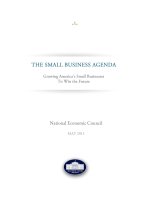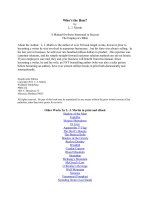Who owns the future jaron lanier
Bạn đang xem bản rút gọn của tài liệu. Xem và tải ngay bản đầy đủ của tài liệu tại đây (3.78 MB, 264 trang )
Thank you for downloading this Simon & Schuster eBook.
Join our mailing list and get updates on new releases, deals, bonus content and other great books from Simon & Schuster.
CLICK HERE TO SIGN UP
or visit us online to sign up at
eBookNews.SimonandSchuster.comContents
Prelude
Hello, Hero
Terms
PART ONE
First Round
1. Motivation
The Problem in Brief
Put Up or Shut Up
Moore’s Law Changes the Way People Are Valued
Essential but Worthless
The Beach at the Edge of Moore’s Law
The Price of Heaven
The Problem Is Not the Technology, but the Way We Think About the Technology
Saving the Winners from Themselves
Progress Is Compulsory
Progress Is Never Free of Politics
Back to the Beach
2. A Simple Idea
Just Blurt the Idea Out
A Simple Example
Big Talk, I Know . . .
FIRST INTERLUDE: ANCIENT ANTICIPATION OF THE SINGULARITY
Aristotle Frets
Do People Deserve to Be Paid if They Aren’t Miserable?
The Plot
PART TWO
The Cybernetic Tempest
3. Money as Seen Through One Computer Scientist’s Eyes
Money, God, and the Old Technology of Forgetting
The Information Technology of Optimism
4. The Ad Hoc Construction of Mass Dignity
Are Middle Classes Natural?
Two Familiar Distributions
Tweaks to Network Design Can Change Distributions of Outcomes
Letting Bell Curves Be Bell Curves
Star Systems Starve Themselves; Bell Curves Renew Themselves
An Artificial Bell Curve Made of Levees
The Senseless Ideal of a Perfectly Pure Market
Income Is Different from Wealth
The Taste of Politics
Drove My Chevy to the Levee but the Levee Was Dry
How Is Music like a Mortgage?
5. “Siren Servers”
There Can’t Be Complexity Without Ambiguity
A First Pass at a Definition
Where Sirens Beckon
6. The Specter of the Perfect Investment
Our Free Lunch
Candy
Radiant Risk
You Can’t See as Much of the Server as It Can See of You
Waiting for Robin Hood
From Autocollate to Autocollude
Rupture
7. Some Pioneering Siren Servers
My Little Window
Wal-Mart Considered as Software
From the Supply Chain’s Point of View
From the Customer’s Point of View
Financial Siren Servers
SECOND INTERLUDE (A PARODY): IF LIFE GIVES YOU EULAS, MAKE LEMONADE
PART THREE
How This Century Might Unfold, from Two Points of View
8. From Below: Mass Unemployment Events
Will There Be Manufacturing Jobs?
Napsterizing the Teamsters
Flattening the City on a Hill
Factoring the City on a Hill
Education in the Abstract Is Not Enough
The Robotic Bedpan
A Pharma Fable That Might Unfold Later in This Century
9. From Above: Misusing Big Data to Become Ridiculous
Three Nerds Walk into a Bar . . .
Your Lack of Privacy Is Someone Else’s Wealth
Big Data in Science
A Method in Waiting
Wise or Feared?
The Nature of Big Data Defies Intuition
The Problem with Magic
Game On
The Kicker
The Nature of Our Confusion
The Most Elite Naïveté
THIRD INTERLUDE: MODERNITY CONCEIVES THE FUTURE
Mapping Out Where the Conversation Can Go
Nine Dismal Humors of Futurism, and a Hopeful One
Meaning as Nostalgia
Can We Handle Our Own Power?
The First High-Tech Writer
Meaning in Struggle
Practical Optimism
PART FOUR
Markets, Energy Landscapes, and Narcissism
10. Markets and Energy Landscapes
The Technology of Ambient Cheating
Imaginary Landscapes in the Clouds
Markets as Landscapes
Experimentalism and Popular Perception
Keynes Considered as a Big Data Pioneer
11. Narcissism
The Insanity of the Local/Global Flip
Siren Servers Think the World Is All About Them
FOURTH INTERLUDE: LIMITS ARE FOR MUGGLES
The Endless Conversation About the Heart Cartel
The Deadly Risk of Not Being a Shapeshifter
The First Musical “Any”
Climb Any “Any”
PART FIVE
The Contest to Be Most Meta
12. Story Lost
Not All Is Chaos
The Conservation of Free Will
13. Coercion on Autopilot: Specialized Network Effects
Rewarding and Punishing Network Effects
For Every Carrot a Stick
Denial of Service
Arm’s-Length Blackmail
Who’s the Customer and Who Are All Those Other People?
14. Obscuring the Human Element
Noticing the New Order
Who Orders the Data?
The Human Shell Game
15. Story Found
The First Act Is Autocatalytic
Since You Asked
Why the Networked World Seems Chaotic
When Are Siren Servers Monopolies?
Free Rise
Make Others Pay for Entropy
Bills Are Boring
Coattails
The Closing Act
Stories Are Nothing Without Ideas
FIFTH INTERLUDE: THE WISE OLD MAN IN THE CLOUDS
The Limits of Emergence as an Explanation
The Global Triumph of Turing’s Humor
Digital and Pre-digital Theocracy
What Is Experience?
PART SIX
Democracy
16. Complaint Is Not Enough
Governments Are Learning the Tricks of Siren Servers
Alienating the Global Village
Electoral Siren Servers
Maybe the Way We Complain Is Part of the Problem
17. Clout Must Underlie Rights, if Rights Are to Persist
Melodramas Are Tenacious
Emphasizing the Middle Class Is in the Interests of Everyone
A Better Peak Waiting to Be Discovered
SIXTH INTERLUDE: THE POCKET PROTECTOR IN THE SAFFRON ROBE
The Most Ancient Marketing
Monks and Nerds (or, Chip Monks)
It’s All About I
“Abundance” Evolves
Childhood and Apocalypse
PART SEVEN
Ted Nelson
18. First Thought, Best Thought
First Thought
Best Thought
The Right to Mash-up Is Not the Same as the Right to Copy
Two-Way Links
Why Isn’t Ted Better Known?
PART EIGHT
The Dirty Pictures (or, Nuts and Bolts: What a Humanistic Alternative Might Be
Like)
19. The Project
You Can’t Tweet This
A Less Ambitious Approach to Be Discouraged
A Sustainable Information Economy
A Better Beach
20. We Need to Do Better than Ad Hoc Levees
Keep It Smooth
Not Enough Money Grows on Trees
21. Some First Principles
Provenance
Commercial Symmetry
Only First-Class Citizens
Eschewing Zombie Siren Servers
Only First-Class Identity
22. Who Will Do What?
Biological Realism
The Psychology of Deserving
But Will There Be Enough Value from People?
A Question That Really Isn’t That Hard to Answer
Nothing More to Offer?
To the Dead Their Due
23. Big Business
What Will Big Companies Do?
The Role of Advertising
24. How Will We Earn and Spend?
When Will Decisions Be Made?
Dynamic Value
Earning a Little Money by Living Well or Interestingly
25. Risk
The Cost of Risk
Risk Never Really Goes Away
Puddle, Lake, or Ocean?
26. Financial Identity
Economic Avatars
Economic Avatars as an Improvement on the Forgetfulness of Cash
Interpersonal Economic Symmetry Through Theatrics
Economic Network Neutrality
Symmetry as a Disincentive to Game the System
Faith and Credit
Tax
27. Inclusion
The Lower Half of the Curve
The Lowly Tail of the Curve
Wealth and Civility
28. The Interface to Reality
How Great Are Our Powers?
Waiting for Technology Waiting for Politics
What Can We Do About Big Data and the Reality Problem?
Carbon Copies Ruin Carbon Credits
How Fighting “Fraud” Might Also Fight “Scams”
Feeding the Frenetic Mind of the Networked Person
It’s All in the Timing
The Treachery of Toys
29. Creepy
Three Pervasive Creepy Conundrums
A Hacker’s Paradise
Creepiness Thrives on the Quest for Utopia
Once Upon a Time I Hoped to Wish Paranoia Away
The ’Net Is Watching
Some Good Reasons to Be Tracked by the Cloud
The Creepiness Is Not in the Tech, but in the Power We Grant to Siren Servers
Maslow’s Pyramid of Blackmail
The Weird Logic of Extreme Creepiness
30. A Stab at Mitigating Creepiness
Commercial Rights Scale Online Where Civil Rights Don’t
Commercial Rights Are Actionable
The Ideal Price of Information Equals the Minimization of Creepiness
Individual Players Will Also Be Motivated to Set Prices to Minimize Creepiness
SEVENTH INTERLUDE: LIMITS ARE FOR MORTALS
From Social Network to Immortality
Supernatural Temptations in Tech Culture
Just for the Record, Why I Make Fun of the University
Will the Control of Death Be a Conversation or a Conflagration?
The Two Tiers of Immortality Planned for This Century
PART NINE
Transition
31. The Transition
Can There Be a Digital Golden Rule?
The Miracle’s Gauntlet
Avatars and Credit
The Price of Antenimbosia
32. Leadership
Audition for the Lead
A Thousand Geeks
Startups
Traditional Governments, Central Banks, etc.
Multiplicities of Siren Servers
Facebook or Similar
Confederacies of Just a Few Giant Siren Servers
EIGHTH INTERLUDE: THE FATE OF BOOKS
Books Inspire Maniacal Scheming
An Author’s Experience of a Book
It’s Not About Paper Versus eBooks
The Book as Silicon Valley Would Have It
What Is It About a Book That Is Worth Saving?
Conclusion: What Is to Be Remembered?
All This, Just for the Whiff of Possibility
The Economics of the Future Is User Interface Design
The Tease of the Tease
Know Your Poison
Is There a Test for Whether an Information Economy Is Humanistic?
Back to the Beach
Appendix: First Appearances of Key Terms
Acknowledgments
About Jaron Lanier
Notes
Index
To everyone my daughter will know as she grows up.
I hope she will be able to invent her place in a world in which it’s
normal to find success and fulfillment.
Prelude
Hello, Hero
An odd thing about this book is that you, the reader, and I, the author, are the immediate protagonists.
The very action of reading makes you the hero of the story I am telling. Maybe you bought, or stole, a
physical copy, paid to read this on your tablet, or pirated a digital copy off a share site. Whatever the
prequel, here you are, living precisely the circumstances described in this book.
If you paid to read this, thank you! This book is a result of living my life as I do, which I hope
provides value to you. The hope of this book is that someday we’ll all have more ways to grow
wealth as a side effect of living our lives creatively and intelligently, with an eye to doing things of
use to others.
If you paid to read, then there has been a one-way transaction in which you transferred money to
someone else.
If you got it for free, there has been a no-way transaction, and any value traded will be off the
books, recorded not in any ledger but rather in the informal value systems of reputation, karma, or
other wispy forms of barter. That doesn’t mean nothing has happened. Maybe you’ll get some positive
strokes over a social network because of what you say about the book. That sort of activity might
benefit us both. But it’s a kind of benefit that is unreliable and perishable.
The clamor for online attention only turns into money for a token minority of ordinary people, but
there is another new, tiny class of people who always benefit. Those who keep the new ledgers, the
giant computing services that model you, spy on you, and predict your actions, turn your life activities
into the greatest fortunes in history. Those are concrete fortunes made of money.
This book promotes a third alternative, which is that digital networking ought to promote a two-
way transaction, in which you benefit, concretely, with real money, as I do. I want digital networking
to cause more value from people to be on the books, rather than less. When we make our world more
efficient through the use of digital networks, that should make our economy grow, not shrink.
Here’s a current example of the challenge we face. At the height of its power, the photography
company Kodak employed more than 140,000 people and was worth $28 billion. They even invented
the first digital camera. But today Kodak is bankrupt, and the new face of digital photography has
become Instagram. When Instagram was sold to Facebook for a billion dollars in 2012, it employed
only thirteen people.
Where did all those jobs disappear to? And what happened to the wealth that those middle-class
jobs created? This book is built to answer questions like these, which will only become more
common as digital networking hollows out every industry, from media to medicine to manufacturing.
Instagram isn’t worth a billion dollars just because those thirteen employees are extraordinary.
Instead, its value comes from the millions of users who contribute to the network without being paid
for it. Networks need a great number of people to participate in them to generate significant value.
But when they have them, only a small number of people get paid. That has the net effect of
centralizing wealth and limiting overall economic growth.
Instead of enlarging our overall economy by creating more value that is on the books, the rise of
digital networking is enriching a relative few while moving the value created by the many off the
books.
By “digital networking” I mean not only the Internet and the Web, but also other networks operated
by outfits like financial institutions and intelligence agencies. In all these cases, we see the
phenomenon of power and money becoming concentrated around the people who operate the most
central computers in a network, undervaluing everyone else. That is the pattern we have come to
expect, but it is not the only way things can go.
The alternative introduced in this book is not a utopian idea; it won’t be hard to foresee its
annoyances and messiness. However, I will argue that monetizing more of what’s valuable from
ordinary people, who turn out to be the uncompensated sources of the data that make networks
valuable in the first place, will lead to a better future.
That will make power and clout more honestly distributed, and might even lead to a persistent
middle class in an information economy, which would otherwise be an impossible goal.
Terms
It would be impossible to only use preexisting terminology to communicate the ideas in this book. The
problem is not that there are no relevant, familiar terms, but that all the preexisting terms have
baggage or common uses that are just enough askew from what I need to say that they bring more
confusion than clarity. So unfamiliar terms and expressions will appear. An appendix contains a list
of some of these terms, along with the pages on which they first appear. Think of it as the high-
priority index.
PART ONE
First Round
CHAPTER 1
Motivation
The Problem in Brief
We’re used to treating information as “free,”* but the price we pay for the illusion of “free” is only
workable so long as most of the overall economy isn’t about information. Today, we can still think of
information as the intangible enabler of communications, media, and software. But as technology
advances in this century, our present intuition about the nature of information will be remembered as
narrow and shortsighted. We can think of information narrowly only because sectors like
manufacturing, energy, health care, and transportation aren’t yet particularly automated or ’net-
centric.
*As exemplified by free consumer Internet services, or the way financial services firms can often gather and use data without
having to pay for it.
But eventually most productivity probably will become software-mediated. Software could be the
final industrial revolution. It might subsume all the revolutions to come. This could start to happen,
for instance, once cars and trucks are driven by software instead of human drivers, 3D printers
magically turn out what had once been manufactured goods, automated heavy equipment finds and
mines natural resources, and robot nurses handle the material aspects of caring for the elderly. (These
and other examples will be explored in detail later on.) Maybe digital technology won’t advance
enough in this century to dominate the economy, but it probably will.
Maybe technology will then make all the needs of life so inexpensive that it will be virtually free
to live well, and no one will worry about money, jobs, wealth disparities, or planning for old age. I
strongly doubt that neat picture would unfold.
Instead, if we go on as we are, we will probably enter into a period of hyper-unemployment, and
the attendant political and social chaos. The outcome of chaos is unpredictable, and we shouldn’t rely
on it to design our future.
The wise course is to consider in advance how we can live in the long term with a high degree of
automation.
Put Up or Shut Up
For years I have presented complaints about the way digital technology interfaces with people. I love
the technology and doubly love the people; it’s the connection that’s out of whack. Naturally, I am
often asked, “What would you do instead?” If the question is framed on a personal level, such as
“Should I quit Facebook?” the answer is easy. You have to decide for yourself. I am not trying to be
anyone’s guru.*
* . . . though I’ll make a suggestion at the end of the book.
On the level of economics, though, I ought to provide an answer. People are not just pointlessly
diluting themselves on cultural, intellectual, and spiritual levels by fawning over digital superhuman
phenomena that don’t necessarily exist. There is also a material cost.
People are gradually making themselves poorer than they need to be. We’re setting up a situation
where better technology in the long term just means more unemployment, or an eventual socialist
backlash. Instead, we should seek a future where more people will do well, without losing liberty,
even as technology gets much, much better.
Popular digital designs do not treat people as being “special enough.” People are treated as small
elements in a bigger information machine, when in fact people are the only sources or destinations of
information, or indeed of any meaning to the machine at all. My goal is to portray an alternate future
in which people are treated appropriately as being special.
How? Pay people for information gleaned from them if that information turns out to be valuable. If
observation of you yields data that makes it easier for a robot to seem like a natural conversationalist,
or for a political campaign to target voters with its message, then you ought to be owed money for the
use of that valuable data. It wouldn’t exist without you, after all. This is such a simple starting point
that I find it credible, and I hope to persuade you about that as well.
The idea that mankind’s information should be made free is idealistic, and understandably popular,
but information wouldn’t need to be free if no one were impoverished. As software and networks
become more and more important, we can either be moving toward free information in the midst of
insecurity for almost everyone, or toward paid information with a stronger middle class than ever
before. The former might seem more ideal in the abstract, but the latter is the more realistic path to
lasting democracy and dignity.
An amazing number of people offer an amazing amount of value over networks. But the lion’s
share of wealth now flows to those who aggregate and route those offerings, rather than those who
provide the “raw materials.” A new kind of middle class, and a more genuine, growing information
economy, could come about if we could break out of the “free information” idea and into a universal
micropayment system. We might even be able to strengthen individual liberty and self-determination
even when the machines get very good.
This is a book about futuristic economics, but it’s really about how we can remain human beings
as our machines become so sophisticated that we can perceive them as autonomous. It is a work of
nonnarrative science fiction, or what could be called speculative advocacy. I’ll argue that the
particular way we’re reorganizing our world around digital networks is not sustainable, and that there
is at least one alternative that is more likely to be sustainable.
Moore’s Law Changes the Way People Are Valued
The primary influence on the way technologists have come to think about the future since the turn of
the century is their direct experience of digital networks through consumer electronics. It only takes a
few years, not a lifetime, for a young person to experience Moore’s Law–like changes.
Moore’s Law is Silicon Valley’s guiding principle, like all ten commandments wrapped into one.
The law states that chips get better at an accelerating rate. They don’t just accumulate improvements,
in the way that a pile of rocks gets higher when you add more rocks. Instead of being added, the
improvements multiply. The technology seems to always get twice as good every two years or so.
That means after forty years of improvements, microprocessors have become millions of times better.
No one knows how long this can continue. We don’t agree on exactly why Moore’s Law or other
similar patterns exist. Is it a human-driven, self-fulfilling prophecy or an intrinsic, inevitable quality
of technology? Whatever is going on, the exhilaration of accelerating change leads to a religious
emotion in some of the most influential tech circles. It provides a meaning and context.
Moore’s Law means that more and more things can be done practically for free, if only it weren’t
for those people who want to be paid. People are the flies in Moore’s Law’s ointment. When
machines get incredibly cheap to run, people seem correspondingly expensive. It used to be that
printing presses were expensive, so paying newspaper reporters seemed like a natural expense to fill
the pages. When the news became free, that anyone would want to be paid at all started to seem
unreasonable. Moore’s Law can make salaries—and social safety nets—seem like unjustifiable
luxuries.
But our immediate experience of Moore’s Law has been cheap treats. Yesterday’s unattainably
expensive camera becomes just one of today’s throwaway features on a phone. As information
technology becomes millions of times more powerful, any particular use of it becomes
correspondingly cheaper. Thus, it has become commonplace to expect online services (not just news,
but 21st century treats like search or social networking) to be given for free, or rather, in exchange for
acquiescence to being spied on.
Essential but Worthless
As you read this, thousands of remote computers are refining secret models of who you are. What is
so interesting about you that you’re worth spying on?
The cloud is driven by statistics, and even in the worst individual cases of personal ignorance,
dullness, idleness, or irrelevance, every person is constantly feeding data into the cloud these days.
The value of such information could be treated as genuine, but it is not. Instead, the blindness of our
standards of accounting to all that value is gradually breaking capitalism.
There is no long-term difference between an ordinary person and a skilled person in this scheme.
For now, many kinds of skilled people do well in a software-mediated world, but if things don’t
change, those who own the top machines will gradually emerge as the only elite left standing. To
explain why, consider how advancing technology could do to surgery what it has already done to
recorded music.
Musical recording was a mechanical process until it wasn’t, and became a network service. At
one time, a factory stamped out musical discs and trucks delivered them to retail stores where
salespeople sold them. While that system has not been entirely destroyed, it is certainly more common
to simply receive music instantly over a network. There used to be a substantial middle-class
population supported by the recording industry, but no more. The principal beneficiaries of the digital
music business are the operators of network services that mostly give away the music in exchange for
gathering data to improve those dossiers and software models of each person.
The same thing could happen to surgery. Nanorobots, holographic radiation, or just plain old
robots using endoscopes might someday perform heart surgery. These gadgets would perform the
economic role that MP3 players and smartphones took on in music delivery. Whatever the details,
surgery would then be reconceived as an information service. The role of human surgeons in that case
is not predetermined, however. They will remain essential, for the technology will rely on data that
has to come from people, but it isn’t decided yet if they’ll be valued in terms that lead to wealth.
Nonspecialist doctors have already lost a degree of self-determination because they didn’t seize
the centers of the networks that have arisen to mediate medicine. Insurance and pharmaceutical
concerns, hospital chains, and various other savvy network climbers were paying better attention. No
one, not even a heart surgeon, should pretend to be indefinitely immune to this pattern.
There will always be humans, lots of them, who provide the data that makes the networked
realization of any technology better and cheaper. This book will propose an alternative, sustainable
system that will continue to honor and reward those humans, no matter how advanced technology
becomes. If we continue on the present path, benefits will instead flow mostly to the tenders of the top
computers that route data about surgery, essentially by spying on doctors and patients.
The Beach at the Edge of Moore’s Law
A heavenly idea comes up a lot in what might be called Silicon Valley metaphysics. We anticipate
immortality through mechanization. A common claim in utopian technology culture is that people—
well, perhaps not everyone—will be uploaded into cloud computing servers* later in this century,
perhaps in a decade or two, to become immortal in Virtual Reality. Or, if we are to remain physical,
we will be surrounded by a world animated with robotic technology. We will float from joy to joy,
even the poorest among us living like a sybaritic magician. We will not have to call forth what we
wish from the world, for we will be so well modeled by statistics in the computing clouds that the
dust will know what we want.
*A “server” is just a computer on a network that serves up responses to other computers. Generally home computers or portable
devices aren’t set up to acknowledge connections from arbitrary other computers, so they aren’t servers. A “cloud” is a collection of
servers that act in a coordinated way.
Picture this: It’s sometime later in the 21st century, and you’re at the beach. A neuro-interfaced
seagull perches and seems to speak, telling you that you might want to know that nanobots are
repairing your heart valve at the moment (who knew you had a looming heart problem?) and the
sponsor is the casino up the road, which paid for this avian message and the automatic cardiology
through Google or whatever company is running that sort of switchboard decades hence.
If the wind starts to blow, swarms of leaves turn out to be subtle bioengineered robots that harness
that very wind to propel themselves into an emergent shelter that surrounds you. Your wants and
needs are automatically analyzed and a robotic masseuse forms out of the sand and delivers shiatsu as
you contemplate the wind’s whispers from your pop-up cocoon.
There are endless variations of this sort of tale of soon-to-appear high-tech abundance. Some of
them are found in science fiction, but more often these visions come up in ordinary conversations.
They are so ambient in Silicon Valley culture that they become part of the atmosphere of the place.
Typically, you might hear a thought experiment about how cheap computing will be, how much more
advanced materials science will become, and so on, and from there your interlocutor extrapolates that
supernatural-seeming possibilities will reliably open up later in this century.
This is the thought schema of a thousand inspirational talks, and the motivation behind a great many
startups, courses, and careers. The key terms associated with this sensibility are accelerating
change, abundance, and singularity.
The Price of Heaven
My tale of a talking seagull strikes me as being kitschy and contrived, but any scenario in which
humans imagine living without constraints feels like that.
But we needn’t fear a loss of constraints. Utopians presume the advent of abundance not because it
will be affordable, but because it will be free, provided we accept surveillance.
Starting back in the early 1980s, an initially tiny stratum of gifted technologists conceived new
interpretations of concepts like privacy, liberty, and power. I was an early participant in the process
and helped to formulate many of the ideas I am criticizing in this book. What was once a tiny
subculture has blossomed into the dominant interpretation of computation and software-mediated
society.
One strain of what might be called “hacker culture” held that liberty means absolute privacy
through the use of cryptography. I remember the thrill of using military-grade stealth just to argue
about who should pay for a pizza at MIT in 1983 or so.
On the other hand, some of my friends from that era, who consumed that pizza, eventually became
very rich building giant cross-referenced dossiers on masses of people, which were put to use by
financiers, advertisers, insurers, or other concerns nurturing fantasies of operating the world by
remote control.
It is typical of human nature to ignore hypocrisy. The greater a hypocrisy, the more invisible it
typically becomes, but we technical folk are inclined to seek an airtight whole of ideas. Here is one
such synthesis—of cryptography for techies and massive spying on others—which I continue to hear
fairly often: Privacy for ordinary people can be forfeited in the near term because it will become
moot anyway.
Surveillance by the technical few on the less technical many can be tolerated for now because of
hopes for an endgame in which everything will become transparent to everyone. Network
entrepreneurs and cyber-activists alike seem to imagine that today’s elite network servers in positions
of information supremacy will eventually become eternally benign, or just dissolve.
In the telling of digital utopias, when computing gets ultragood and ultracheap we won’t have to
worry about the reach of elite network players descended from today’s derivatives funds, or Silicon
Valley companies like Google or Facebook. In a future world of abundance, everyone will be
motivated to be open and generous.
Bizarrely, the endgame utopias of even the most ardent high-tech libertarians always seem to take
socialist turns. The joys of life will be too cheap to meter, we imagine. So abundance will go
ambient.
This is what diverse cyber-enlightened business concerns and political groups all share in
common, from Facebook to WikiLeaks. Eventually, they imagine, there will be no more secrets, no
more barriers to access; all the world will be opened up as if the planet were transformed into a
crystal ball. In the meantime, those true believers encrypt their servers even as they seek to gather the
rest of the world’s information and find the best way to leverage it.
It is all too easy to forget that “free” inevitably means that someone else will be deciding how you
live.
The Problem Is Not the Technology, but the Way We Think About the Technology
I will argue that up until about the turn of this century we didn’t need to worry about technological
advancement devaluing people, because new technologies always created new kinds of jobs even as
old ones were destroyed. But the dominant principle of the new economy, the information economy,
has lately been to conceal the value of information, of all things.
We’ve decided not to pay most people for performing the new roles that are valuable in relation to
the latest technologies. Ordinary people “share,” while elite network presences generate
unprecedented fortunes.
Whether these elite new presences are consumer-facing services like Google, or more hidden
operations like high-frequency-trading firms, is mostly a matter of semantics. In either case, the
biggest and best-connected computers provide the settings in which information turns into money.
Meanwhile, trinkets tossed into the crowd spread illusions and false hopes that the emerging
information economy is benefiting the majority of those who provide the information that drives it.
If information age accounting were complete and honest, as much information as possible would
be valued in economic terms. If, however, “raw” information, or information that hasn’t yet been
routed by those who run the most central computers, isn’t valued, then a massive disenfranchisement
will take place. As the information economy arises, the old specter of a thousand science fiction tales
and Marxist nightmares will be brought back from the dead and empowered to apocalyptic
proportions. Ordinary people will be unvalued by the new economy, while those closest to the top
computers will become hypervaluable.
Making information free is survivable so long as only limited numbers of people are
disenfranchised. As much as it pains me to say so, we can survive if we only destroy the middle
classes of musicians, journalists, and photographers. What is not survivable is the additional
destruction of the middle classes in transportation, manufacturing, energy, office work, education, and
health care. And all that destruction will come surely enough if the dominant idea of an information
economy isn’t improved.
Digital technologists are setting down the new grooves of how people live, how we do business,
how we do everything—and they’re doing it according to the expectations of foolish utopian
scenarios. We want free online experiences so badly that we are happy to not be paid for information
that comes from us now or ever. That sensibility also implies that the more dominant information
becomes in our economy, the less most of us will be worth.
Saving the Winners from Themselves
Is the present trend really a benefit for those who run the top servers that have come to organize the
world? In the short term, of course, yes. The greatest fortunes in history have been created recently by
using network technology as a way to concentrate information and therefore wealth and power.
However, in the long term, this way of using network technology is not even good for the richest
and most powerful players, because their ultimate source of wealth can only be a growing economy.
Pretending that data came from the heavens instead of from people can’t help but eventually shrink the
overall economy.
The more advanced technology becomes, the more all activity becomes mediated by information
tools. Therefore, as our economy turns more fully into an information economy, it will only grow if
more information is monetized, instead of less. That’s not what we’re doing.
Even the most successful players of the game are gradually undermining the core of their own
wealth. Capitalism only works if there are enough successful people to be the customers. A market
system can only be sustainable when the accounting is thorough enough to reflect where value comes
from, which, I’ll demonstrate, is another way of saying that an information age middle class must
come into being.
Progress Is Compulsory
Two great trends are colliding, one in our favor, and the other against us. Balancing our heavenly
expectations, there are also countervailing fears about such things as global climate change and the
problem of finding food and drinking water for the human population when it peaks later in this
century. Billions more people than have ever been sustained before will need water and food.
We bring the great problems of our times on ourselves, and yet we have little choice but to do so.
The human condition is an evolving technological puzzle. Solving one problem creates new ones.
This has always been true and is not a special quality of present times.
The ability to grow a larger population, through reduced infant mortality rates, sets up the
conditions for a greater famine. People are cracking the inner codes of biology, creating amazing new
chemistries, and amplifying our capabilities with digital networks just as we are also undermining
our climate, and critical resources are starting to run out. And yet we are compelled to plunge
forward, because history isn’t reversible. Besides, we must be honest about how bad things were in
lower-tech times.
New technological syntheses that will solve the great challenges of the day are less likely to come
from garages than from collaborations by many people over giant computer networks. It is the politics
and economics of these networks that will determine how new capabilities translate into new benefits
for ordinary people.
Progress Is Never Free of Politics
Maybe the coolest technology could get very good and cheap, while at the same time crucial
fundamentals for survival could become expensive. The calculi of digital utopias and man-made
disasters don’t contradict each other. They can coexist. This is the heading of the darkest and funniest
science fiction, such as the work of Philip K. Dick.
Basics like water and food could soar in cost even as intensely sophisticated gadgets, like
automated nanorobotic heart surgeons, float about as dust in the air in case they are needed,
sponsored by advertisers.
Everything can’t become free at once, because the real world is messy. Software and networks are
messy. And the sprawling miracle of information-animated technology rests on limited resources.
The illusion that everything is getting so cheap that it is practically free sets up the political and
economic conditions for cartels exploiting whatever isn’t quite that way. When music is free,
wireless bills get expensive, insanely so. You have to look at the whole system. No matter how petty
a flaw might be in a utopia, that flaw is where the full fury of power seeking will be focused.
Back to the Beach
You sit at the edge of the ocean, wherever the coast will be after Miami is abandoned to the waves.
You are thirsty. Random little clots of dust are full-on robotic interactive devices, since advertising









